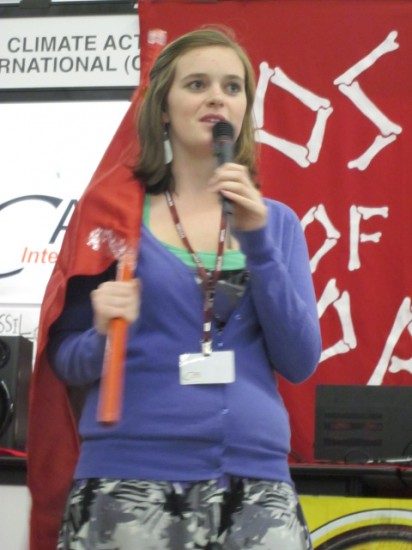
Carra Cheslin rocks the mic at COP-16. Photo courtesy of Carra Cheslin.
When most people think of Cancun, the first images that come to mind are sandy beaches and spring break festivities. For me however, the phrases “climate change actions” and “international youth mobilization” are much more relevant.
I am currently serving as a youth delegate to the United Nations Framework Convention on Climate Change, Sixteenth Conference of the Parties in Cancun (abbreviated as UNFCCC COP-16), which takes place from November 29 to December 10. I was lucky enough to be accepted to the SustainUS youth delegation (a United States-based youth non-governmental organization) and thus have the great opportunity to share this experience with nineteen other young adults from around the United States. However, I am quickly becoming aware that we are not alone in our fight for climate justice: there is a strong youth voice in these negotiations, both national and international.
Over the past week I have met, been inspired by and developed relationships with these youth, each of whom have come to Cancun for the same reason: to ensure a healthy and sustainable environment for future generations. I was introduced to the world of international youth climate change mobilization through the official UN constituency of international youth delegations known as YOUNGO.
YOUNGO is an amazing organization of talented and dedicated youth whose focus is on capacity building for the youth climate movement and increasing the influence that young people have at the international climate change negotiations. To strengthen our impact, YOUNGO is broken up into working groups, each focused on a different aspect of UN climate change policy, campaigns, actions and building relationships with media.
Despite my inexperience with the Conference of the Parties process and negotiations, I was wholeheartedly welcomed into this constituency and immediately began forming connections with other youth climate activists. Given my personal interest in environmental activism, I have become very involved in and currently facilitate the YOUNGO Actions working group. This group supports youth platforms on policy issues with creative demonstrations in public areas of the conference center with the purpose of influencing negotiators. Getting to work so closely with youth who have different skill sets and experiences, but an equally strong motivation and commitment to put their all into affecting global climate change has been an incredible and unique learning opportunity.
This year’s UN climate change negotiations, known as COP-16, is a very interesting one in that it immediately followed COP-15 in Copenhagen, which received an influx of press and youth attendance, but a less than satisfactory result. At COP-3 in Japan, an international agreement known as the Kyoto Protocol was created, and as of now has been signed by 121 nations. This agreement set binding targets for thirty-seven industrialized countries and the European Union for reducing greenhouse gas emissions between 2008 and 2012.
COP-15 in Copenhagen was supposed to identify how countries would agree to pursue emission reductions after 2012, but instead the conference produced a non-binding document, called the Copenhagen Accord—considered a disappointment by many. The impacts that COP-15 has had on the COP-16 talks in Cancun primarily center around a largely pessimistic sentiment that there is no real chance for any significant climate agreements to come out of the conference.
While negotiators and others might consider this and choose to act apathetically towards the negotiating process at COP-16, international youth as a whole have become even more motivated to use this period of stalling to emphasize the stronger role that young people should be playing in these conferences. There is a great deal that we can accomplish during these two weeks in Cancun between media-grabbing actions and policy interventions. Given the energy that we are bringing to the table, I am confident that young adults have the potential to make a huge impact. •










[…] Climate Justice: A Shout-Out from COP-16 […]